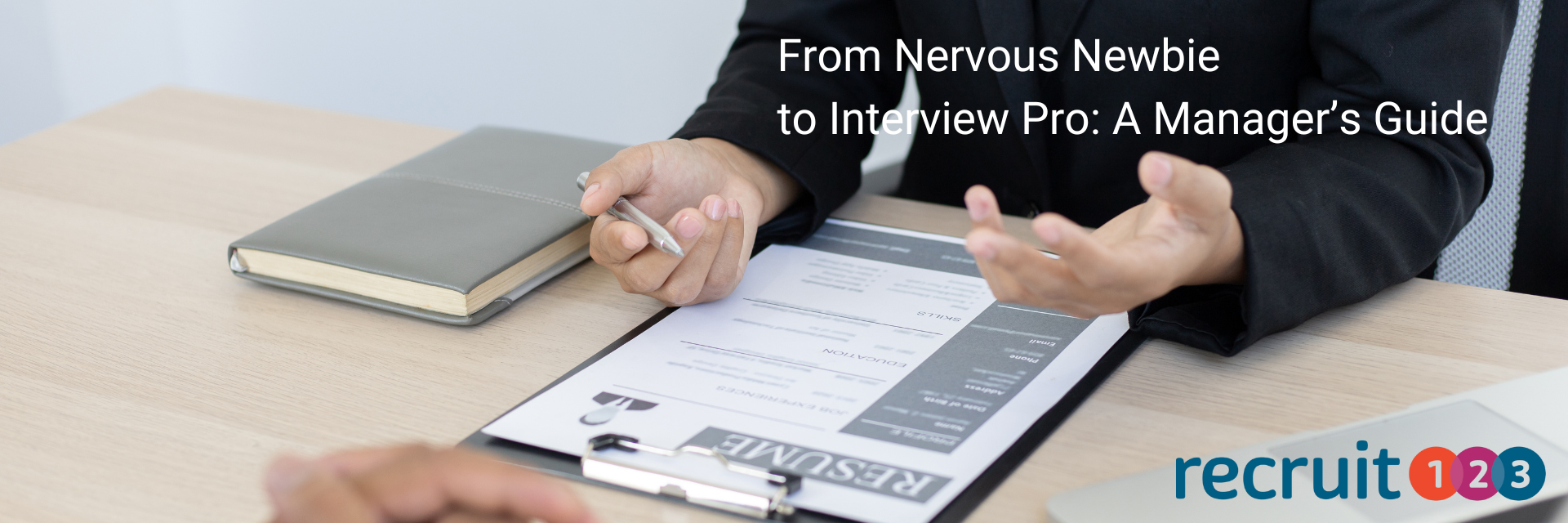 BACK
BACK
From Nervous Newbie to Interview Pro: A Manager’s Guide
Stepping into the interviewer’s chair for the first time can be daunting. If you’re a manager with zero experience in conducting interviews, you might be feeling a bit like a fish out of water. But don’t worry – interviewing is a skill you can learn, and this guide will help you feel prepared, confident, and maybe even enjoy the process. Our latest blog gives some practical techniques to get you started.
1. Preparation Is Key (No Wingin’ It!)
Think of the interview as a first date: you wouldn’t show up without brushing your teeth and thinking of a few things to talk about. The same goes for interviewing. Review the candidate’s CV beforehand, understand the role you’re hiring for, and have a list of questions ready. Avoid clichés like “Where do you see yourself in five years?” unless you genuinely care about the answer!
Instead, prepare a mix of@
- Skill-based questions: “Can you tell me about a time you solved a problem at work?”
- Cultural fit questions: “What kind of work environment helps you thrive?”
- Role-specific scenarios: “How would you approach [specific task related to the job]?”
2. Create a Comfortable Environment
Let’s be real: interviews can be nerve-wracking for candidates. As a first-time interviewer, you might feel the same! Put both of you at ease by starting with a bit of small talk. Ask about their journey to your office (bonus points if they braved public transport) or comment on the weather – a classic British icebreaker. The more relaxed the atmosphere, the more authentic the conversation will be.
3. Avoid the Monologue Trap
It’s tempting to fill silences with your own voice, especially if you’re nervous. But remember, this is the candidate’s time to shine. Ask open-ended questions and give them the space to elaborate. Resist the urge to jump in with your own anecdotes about how you handled things in 1999.
4. Listen (Really Listen!)
Active listening is a superpower. Nod, maintain eye contact, and don’t zone out thinking about lunch. Take notes if it helps you focus, but don’t scribble frantically – you’re not a court stenographer. Listen for specifics in their answers: Are they giving clear examples? Do they demonstrate problem-solving skills? Are they showing enthusiasm for the role?
5. Beware of Bias
It’s easy to be swayed by first impressions, but remember: you’re hiring for skills and fit, not for someone who shares your passion for cricket or has a degree from your alma mater. Stay objective and use a scoring system if it helps. Rate each candidate on key competencies to ensure fairness.
6. Make It a Two-Way Street
An interview isn’t an interrogation. The candidate should be evaluating you and the company as much as you’re evaluating them. Encourage questions about the role, team, and company culture. Be honest – overselling the job might win them over temporarily, but it could lead to disappointment down the line.
7. Handle Curveballs with Grace
What if a candidate asks something you don’t know, like, “What’s the team’s long-term vision?” Don’t panic! It’s fine to admit you’re not sure and offer to find out. Honesty is better than fumbling through a half-baked answer.
Similarly, if a candidate’s answer isn’t clear, don’t be afraid to ask follow-up questions. “Can you elaborate on that?” or “Could you walk me through your thought process?” can work wonders.
8. Watch for Red Flags
Sometimes, a candidate’s answers or behaviour might raise concerns. Keep an eye out for:
- Vague or evasive answers to straightforward questions.
- A lack of enthusiasm or interest in the role.
- Overly negative comments about previous employers (venting is one thing, but excessive blame is another).
Trust your instincts but balance them with evidence. If you’re unsure, bring in a second opinion.
9. Wrap It Up Gracefully
As the interview winds down, thank the candidate for their time and explain the next steps. Will there be another interview? When can they expect to hear back? Clear communication is key to leaving a positive impression, even if they’re not the right fit.
10. Reflect and Learn
After the interview, take a few minutes to jot down your impressions and evaluate the candidate against your criteria. If you’re new to this, ask a colleague or HR professional for feedback on how you conducted the interview. Over time, you’ll develop your style and learn what works best for you.
You could also ask Recruit123 about their interview training, designed for managers with little interview experience to help a business with future team recruitment.
A Final Word: It’s OK to Be Nervous
First interviews can be a little clunky, and that’s perfectly fine. You’re learning a new skill, and every interview you conduct will make you better. Approach the process with curiosity and a sense of humour and remember: even the most seasoned interviewers were beginners once.
Good luck with your first interview! With these tips, you’re well on your way to finding the perfect addition to your team – and maybe even enjoying the journey!


